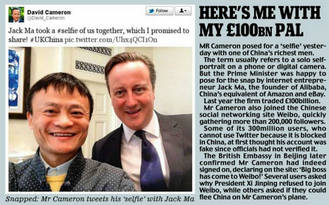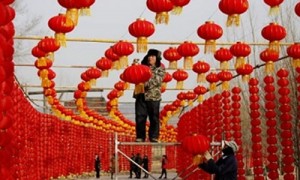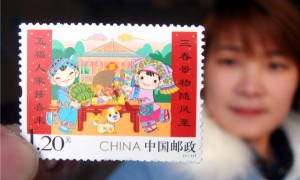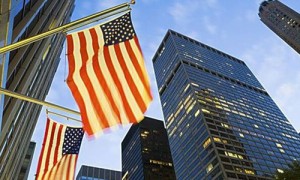Prime Minister is on an official business trip to China
He posted a photo of himself and Chinese entrepreneur Jack Ma on Twitter
Chinese state-run newspaper has labelled Britain a fallen great power
Editorial said Britain was now just a destination for tourists and students
Cameron is leading Britain's largest trade mission to China
David Cameron has been forced to shrug off an attack by a Chinese newspaper that described the UK as ‘just an old European country’ only fit for tourists and students.
The Prime Minister said he would concentrate on the ‘facts and figures’ showing rapidly increasing Chinese investment in Britain, rather than the excoriating article in the Beijing-based Global Times.
The piece accused Mr Cameron of acting provocatively in meeting the exiled Tibetan spiritual leader the Dalai Lama last year, an encounter which plunged Sino-British relations into a deep freeze from which they are only now recovering.
It also took Mr Cameron to task for comments backing expanded democracy in former British colony Hong Kong.
The Global Times, which is owned by the official Communist Party People’s Daily newspaper, said: ‘The Cameron administration should acknowledge that the UK is not a big power in the eyes of the Chinese.’
The timing of the attack was particularly awkward, with Mr Cameron in the country and Downing Street basking in Chinese president Xi Jinping’s description of the ‘indispensable relationship’ between his country and the UK.
The editorial added: ‘We’ve discovered that Britain is easily replaceable in China’s European foreign policy.
‘Moreover, Britain is no longer any kind of “big country”, but merely a country of old Europe suitable for tourism and overseas study, with a few decent football teams.’ Its sneering conclusion said: ‘We wish Prime Minister Cameron and his delegation a pleasant visit to China.’
The newspaper appeared to backtrack later, apparently on the orders of the Chinese government, with a softer piece about the Prime Minister.
It said: ‘China and the UK hold divergent views in terms of human rights, democracy and freedom because of different development phases, political systems and ideologies. But this should neither dominate bilateral ties nor overshadow the momentum for cooperation.’
The Prime Minister, who yesterday hosted a lunch attended by 600 business leaders and officials in Shanghai, said he was not concerned by the editorial.
Speaking on the second day of his visit to China, he said: ‘I would just prefer to go on the figures. This is a visit that has delivered almost £6billion worth of deals.
It is a visit that comes on the back of an 18-month period where we have seen more Chinese investment into Britain than in the previous thirty years.’
CHINA'S YUAN OVERTAKES THE EURO TO BECOME THE WORLD'S SECOND MOST USED CURRENCY FOR INTERNATIonAL TRADE
China's yuan currency overtook the euro in October becoming the second-most used currency in trade finance, global transaction services organisation SWIFT has said.
The market share of yuan usage in trade finance, or Letters of Credit and Collection, grew to 8.66 percent in October 2013. That improved from 1.89 percent in January 2012.
The yuan, also known as the renminbi, now ranks behind the U.S. dollar, which remains the leading currency with a share of 81.08 percent.
The top five countries using the yuan for trade finance in October were China, Hong Kong, Singapore, Germany and Australia, SWIFT said in a statement.
Franck de Praetere, SWIFT's Asia Pacific head of payments and trade markets said: 'The RMB is clearly a top currency for trade finance globally and even more so in Asia.'
The RMB remained the 12th payments currency of the world, with a slightly decreased share of 0.84 percent compared with 0.86 percent in September.
RMB payments increased in value by 1.5 percent in October, while growth for all payments currencies was at 4.6 percent.
The world's second-largest economy is accelerating the pace of financial reform to promote its currency to international players beyond Hong Kong.
China aims to lift the yuan's global clout and reduce its reliance on the U.S. dollar.
Yuan trade settlement has expanded quickly since it first began in 2009 and the percentage of China's total trade settled in yuan has risen from 12 per cent in 2012 to nearly 20 per cent.
新闻资讯:
据英国《每日邮报》12月3日报道,英国首相卡梅伦在其推特上传了自己与中国企业家马云的照片。而报纸随后评论道,虽然卡梅伦在照片中轻松自如,但照片后潜在的外交阵线已是隆隆作响。

该评论主要针对同日中国媒体《环球时报》发表的社论。在社论中,《环球时报》称英国已不再是什么大国。并称:“英国在中国的欧洲外交中‘可替代性’很强,而且‘英国’也不再是什么大国,它就是一个欧洲老牌国家,适合旅游和留学,有几支好球队。”
报道称,《环球时报》的此番评论是在卡梅伦带领贸易代表团离开北京前往上海时发表的。卡梅伦在上海,这个中国的经济中心,强调了增强贸易和投资的重要性。
卡梅伦在结束了与中国主席习近平及总理李克强的会谈后,于周一晚乘专机飞往上海。在上海,他在交通大学发表了演讲。
《每日邮报》还称,卡梅伦此次访问的目的之一是急于敲定那些正在进行中的中英贸易协定。报道还称,相对于德国和法国,英国之前对中国这个世界第二大经济体的贸易积极性略显逊色。



![经典常用英语口语500句[收藏]](https://www.yingyuw.cn/file/upload/202110/06/230235911.png)



